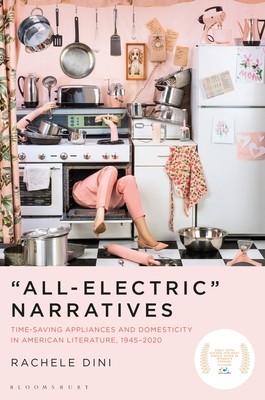
- We will send in 10–14 business days.
- Author: Rachele Dini
- Publisher: Bloomsbury Academic
- ISBN-10: 1501383930
- ISBN-13: 9781501383939
- Format: 15.2 x 22.9 x 2 cm, minkšti viršeliai
- Language: English
- SAVE -10% with code: EXTRA
Reviews
Description
"All-electric" Narratives is the first in-depth study of time-saving electrical appliances in American literature. It examines the literary depiction of refrigerators, vacuum cleaners, oven ranges, washing machines, dryers, dishwashers, toasters, blenders, standing and hand-held mixers, and microwave ovens between 1945, when the "all-electric" home came to be associated with the nation's hard-won victory, and 2020, as contemporary writers consider the enduring material and spiritual effects of these objects in the 21st century.
The appropriation and subversion of the rhetoric of domestic electrification and time-saving comprises a crucial, but overlooked, element in 20th-century literary forms and genres including Beat literature, Black American literature, second-wave feminist fiction, science fiction, and postmodernist fiction. Through close-readings of dozens of literary texts alongside print and television ads from this period, Dini shows how U.S. writers have unearthed the paradoxes inherent to claims of appliances' capacity to "give back" time to their user, transport them into a technologically-progressive future, or "return" them to some pastoral past. In so doing, she reveals literary appliances' role in raising questions about gender norms and sexuality, racial exclusion and erasure, class anxieties, the ramifications of mechanization, the perils and possibilities of conformity, the limitations of patriotism, and the inevitable fallacy of utopian thinking-while both shaping and radically disrupting the literary forms in which they operated.EXTRA 10 % discount with code: EXTRA
The promotion ends in 23d.14:43:05
The discount code is valid when purchasing from 10 €. Discounts do not stack.
- Author: Rachele Dini
- Publisher: Bloomsbury Academic
- ISBN-10: 1501383930
- ISBN-13: 9781501383939
- Format: 15.2 x 22.9 x 2 cm, minkšti viršeliai
- Language: English English
"All-electric" Narratives is the first in-depth study of time-saving electrical appliances in American literature. It examines the literary depiction of refrigerators, vacuum cleaners, oven ranges, washing machines, dryers, dishwashers, toasters, blenders, standing and hand-held mixers, and microwave ovens between 1945, when the "all-electric" home came to be associated with the nation's hard-won victory, and 2020, as contemporary writers consider the enduring material and spiritual effects of these objects in the 21st century.
The appropriation and subversion of the rhetoric of domestic electrification and time-saving comprises a crucial, but overlooked, element in 20th-century literary forms and genres including Beat literature, Black American literature, second-wave feminist fiction, science fiction, and postmodernist fiction. Through close-readings of dozens of literary texts alongside print and television ads from this period, Dini shows how U.S. writers have unearthed the paradoxes inherent to claims of appliances' capacity to "give back" time to their user, transport them into a technologically-progressive future, or "return" them to some pastoral past. In so doing, she reveals literary appliances' role in raising questions about gender norms and sexuality, racial exclusion and erasure, class anxieties, the ramifications of mechanization, the perils and possibilities of conformity, the limitations of patriotism, and the inevitable fallacy of utopian thinking-while both shaping and radically disrupting the literary forms in which they operated.

Reviews